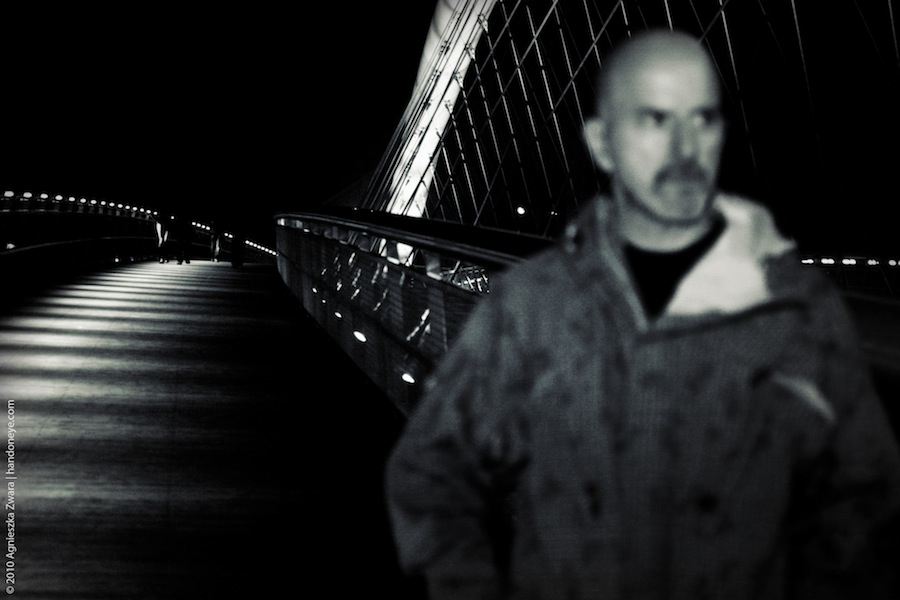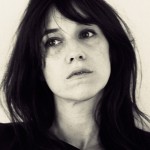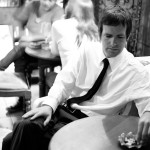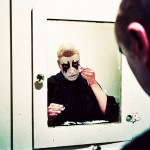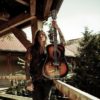This may come as a surprise given how sinister his Lustmord soundscapes are, but Brian Williams’ day-to-day demeanor is downright delightful. In fact, he talks so fast–and with a thick British accent, no less–it’s hard to follow it all.
Here’s what you need to know about him in a nutshell, though: for the past three decades, Williams has gleefully plunged willing parties in his own personal hell, establishing the blueprint for black-hearted ambient music in the process. Without him, it’s hard to imagine anyone from Demdike Stare to Svarte Greiner existing. Just ask one of Williams’ many collaborators from over the years, including key members of the Melvins (Buzz Osborne), Tool (Maynard James Keenan, Adam Jones), and Isis (Aaron Turner).
Beyond all of his own albums, remixes, and side projects, Williams is also one a well-established sound designer, known for his richly woven work on such films as The Crow, Underworld, and From Dusk Til Dawn. Over the course of his many years working alongside SPK frontman Graeme Revell, Williams even left his mark on such unlikely Hollywood projects as Mighty Morphin Power Rangers and Dennis the Menace II.
So yeah–there’s more to his music than the overwhelming sense that the world’s about to end. Find out what we mean in the following rare interview, and be sure to check out an exclusive excerpt from his Unsound 2010 set below. Tickets and details for Lustmord’s two April 10 appearances at the U.S. version of Unsound are available at the Blackened Music site now…
“Don’t even get me started on that”
So what have you been up to lately? Rehearsing for your upcoming gigs?
[Laughs] Rehearse? I have a bunch of stuff prepared but I prefer to mix and match my material on the fly. That’s usually more interesting.
Well, I didn’t mean sitting there rehearsing with your laptop so much as sketching out your sets conceptually, since big ideas usually preface the music in your albums.
Yeah. You’ve been doing your research. I’m impressed. The simple answer is that I don’t have a similar approach [with my live set]. Since I didn’t play live for so many years, I thought it’d be fun to mash together bits and pieces of albums from the past 25 years or so.
So does that mean you’ve had to do what you hate the most: listen to your own records a lot?
Yeah, I’ve actually gone back to the elements that created the tracks, which is a little more interesting. It ends up with a lot of, “Oh, I remember that noise, but what’s that?” I’ve also been slowly introducing new material into the sets. I’m hoping that each show is slightly different.
I read somewhere that seeing Kraftwerk made you realize that it’s possible to put an entertaining set together with laptops.
Kraftwerk is about as good as it gets. When the studio became an instrument for me, it simply was impractical for me to do anything live, what with all the gear involved. When the technology became more powerful, the gear got smaller and smaller, but the idea of performing the songs still sounded really boring. I mean, I wouldn’t pay to see someone in front of a laptop. But seeing Kraftwerk do it [well] made me think, ‘Well, I guess you can do something cool with a laptop if you have really good sound.’
When did you first fall in love with sound itself? The very potential of it?
That’s a good question. There wasn’t a specific time, really. It’s always been something that’s interested me. What constitutes a “cool sound” is subjective. As far back as I can remember, I’ve been drawn to them, though. There’s more of an electronic influence on proper radio stations in Britain, or things like Doctor Who…
What about the Radiophonic Workshop?
Right. Some popular TV shows and novelty records used stuff like that. Movies were also a major influence, and I went to art school, which was a great way of delaying getting a real job.
You didn’t finish art school though, right?
No, we had a mutual agreement that I should leave after about a year or so. I haven’t done any art like that since then. I was just done with it, and when I stopped doing that is when I started doing [music] of my own. I learned how to express myself through sound rather than pictures.
Did you have to pick a specific discipline in art school?
The first year was foundation courses. I was really good at fine art, like sculptures and photography. They were trying to push me into advertising, which is okay, but it’s not who I was. To be honest, I didn’t know what the fuck I wanted to do, really.
And you left art school around when punk was breaking too, right?
I left around ’76 or ’77, which was when the first Clash single came out, the Ramones…that music was really important for a couple generations there. Although after about six months, it became a regimented uniform. Don’t even get me started on that.
Who did you end up hanging out with first once you quit art school? [SPK founder] Graeme [Revell]?
I actually ended up getting a job at a bank first, but that’s a whole different story. I met some people in the punk scene, like members of the Clash, but then there was this electronic group making waves called Throbbing Gristle. I was really taken aback by their first album. I loved how it sounded different and interesting. I actually wrote to them and said their album is really good, and we corresponded for a while, worked on some gigs. They said I should check out SPK, so I did, and started writing to Graeme. That was the very beginning of it…
“I take what I do very seriously, but life is a joke, really”
It must be surreal looking back at that time now. You must have all been out of your minds back then.
What makes you think things are any different now? [Laughs] My theory about life is that you’ve essentially established who you are as a person by the time you’ve turned 25, from your politics to your morals to your belief system. It’s not all downhill from there, but 25 years later, all that’s changed is you look in the mirror and think, ‘Who is that guy?’
Graeme’s someone you worked with for many years. What were some things you bonded over, both creatively and personally?
Well, I haven’t worked with, or spoke to him, in about 10 years. It was a very ugly split…But anyway, we had written back and forth and became friends, basically. I worked with SPK for a little while, and since we were on the same page, it was natural that we’d work together [on sound design projects and film scores].
I assume you’re still close with Chris & Cosey?
They’re two of my oldest, closest friends.
Do you think you’ll ever work on something together again?
We’d like to.
It seems like the right time for it, as many younger musicians are rediscovering the key records you all did in the ’80s now. A lot of it’s come full circle, right down to how you’ve worked with some of the Hydra Head guys, [Melvins frontman] Buzz [Osborne], and [Tool bassist] Adam [Jones].
Adam was actually the catalyst for all of that stuff. The punk thing I originally came from was all about helping each other out. It wasn’t a scene like other people made it out to be. The one thing we all had in common was that we were all outsiders. We were all fighting the good fight.
It was a support system, not a scene.
Right, whether that meant loaning equipment or putting out releases. Everyone benefits then. That’s the socialist in me. [Laughs] Most of the people stayed that way, although some got obsessed with fame, fortune, and stabbing one another in the back.
So it was refreshing to meet Hydra Head and see that there are still people who help each other out. It gives you some hope.
And then there’s Tool, who has a large audience despite being a pretty difficult band.
Right, and the great thing about them is they put their money where their mouth is. I have a lot of respect for them.
I bet you have a lot in common with [Tool frontman] Maynard [James Keenan], too, in that you’re both constantly referred to as “dark artists” despite having quite a sense of humor.
Maynard’s very funny. You know, I take what I do very seriously, but life is a joke, really.
Have you ever tried to write major key music and realized you simply can’t do it?
Well, first of all, I don’t know what a major key is. [Laughs] I just do what sounds good to me. There’s a certain style that I like, so that’s usually what I end up doing.
You’ve been doing this for a long time, and have a really strong, distinct aesthetic to your work. Do you feel like it took you a few albums to establish it?
With many musicians, the first album is often the best. With my first album (1981’s Lustmørd LP), I knew what I wanted to do, but I hadn’t found my voice yet. The second album (1984’s Paradise Disowned) showed two sides–ritualistic ambient music, and the noise I’d been doing.
Your early shows often involved sneaking on stage and pretending you’re the opening act. Did those sets just sound like noise?
Yeah, they were all noisy; pretty in-your-face. They didn’t last too long because of security, though. You couldn’t just go up there and play a 20-minute ambient track.
Did it take a few years for the local scene to recognize what you were doing and legitimately book you?
I had a few gigs by 1981 or so, and did some with SPK, but then I didn’t play any for another 25 years. I got really involved in the studio, and time just kept going by.
“It was a real gamble”
Since your music is so dependent on computers and you got started in the early ’80s, you must have been working within some pretty severe limitations for the first decade or so, like samplers that can only capture a few seconds at a time.
I started using computers with my third album, Heresy [in 1990]. My setup was an Atari computer with a half a megabyte of memory and a sampler with the same. So it was very lo-fi.
How did you capture the music before that then?
I had to borrow equipment for my first two albums. People often ask me what equipment I use to get this sound and I always say, “It doesn’t matter what kind of fucking equipment you use. What matters is that you have good ideas and interesting things to say.” Copying someone you like with the right equipment isn’t going to be the least bit interesting.
But anyway, I remember SPK buying an 8-bit sampler and a computer back in 1984, and it cost as much as a house. I remember buying my first 1-gig drive as well, and it cost me $6,000 dollars. For one gig. At the time, it was a real gamble. Two weeks later, it was full, and within a few months, it paid for itself.
The field recording stuff you’ve done must have been a nightmare in the ’80s, too.
I tried to keep it as compact as possible–to a couple well-stocked suitcases. The batteries were fucking heavy, though. It was a major pain in the ass.
People often obsess over the locations you’ve pulled samples from. Whether it’s a crypt or a slaughterhouse, they seem to think the recordings were a ritualistic choice rather than one based on acoustics. What’s your take on that?
It was a little bit of both–50/50 conceptually. Some of the coolest places were the worst for recording, though, to the point where I might as well have stayed home.
What’s an example of that?
Medieval places can sound pretty flat and boring. Others were really great, though. Like this one meatpacking place had amazing acoustics. The problem is where people attach the entire concept to the place. Then it becomes a shadow of what it really means. That’s why I stopped doing things like that.
Well, your concepts have always been abstract.
Yeah, I don’t want to make things too obvious. The concepts–the how’s and the why’s–are important, but it’s not important for people to know that they’re there.
If people listen closely, there are a lot of thematic strains linking different records, right?
There are some underlying philosophies, yeah. Sometimes people will ask me about something specific, which is great–when they actually get it.
A lot of ambient artists let their music drift and are more free associative with their work. You seem like the opposite–the ideas always come first.
I always know how an album is going to start, where it’s going to go, and where it’s going to end. Coming up with the concepts is often the fun part. Recording can be very grueling. Sometimes cool things happen, where you go on proper tangents, but most of the time, I’m already thinking about the next project while I’m recording the current one. By the time I’m done with all the mixing and mastering, I’m so fucking done with it.
General speaking, do you collaborate with people live in the studio, or do they usually send you tracks?
I’m known for being this solo person, but I actually prefer throwing ideas around with people. It’s also nice to have a filter around–someone to tell you an idea isn’t as good as you think it is.
The songs change in the studio sometimes then?
They should. Otherwise, there’s no point in collaborating. You’re just being a tyrant. Some projects are done over E-mail, though. Like with Puscifer, [Keenan] was on tour with Tool most of the time, and we finished it all up in Arizona.
You did an entire album of dub remixes for Puscifer. Could you ever see recording original dub-based songs?
I’ve had a project on the back burner for a while now that’s like that. It’s kinda tricky. Buzz and I have talked about that kind of thing, but he’s always busy. And my friend Wes Borland was gonna play, but then Limp Bizkit decided to reform. Sasha Grey also talked about doing some stuff. I’ve started some tracks, but I’d like some people to come in and push them in another direction.
Things have gotten so much harder now, what with all of the illegal downloading. You have to be careful with what you choose to release. Since this is my day job, I can’t spend six months on something and then have everyone illegally download it.
If you were to do a dub project, would it be under another name?
Yes. I think people would be really resistant to it if I did a straight-up dub album under the name Lustmord.
“I have a pretty broad palette”
One record people don’t ask you about that much is the one you did with Metal Beast. I’m a little curious about that, as it shows how much you’re also into electronic producers like Autechre.
Oh yeah. I love Autechre. Absolutely. Shad [T. Scott], the Metal Beast guy, is a really good friend of mine. He’s got an interesting story, too. He does production work during the daytime–things like Alanis Morissette–but then he comes home and makes this Aphex Twin-like music. That project was all about collaborating with a good friend and enjoying the process, basically.
You’ve also worked with Paul Haslinger a lot. He was in Tangerine Dream at one time. Were you ever into Kraut stuff beyond Kraftwerk?
Tangerine Dream was really interesting up until 1975 or so, then it was all downhill. Those early records were great, though–Phaedra, Rubycon and Richochet.
One of the reasons I asked about them is that most people would consider their later music the antithesis of yours, sounding overtly hopeful as opposed to hopeless.
[Laughs] I see your point.
You mentioned earlier that the person you are at 25 is often the person you stay the rest of your life. With that in mind, I have to wonder if there were any books or movies that were particularly eye-opening to you at a younger age.
Corny stuff like J.G. Ballard; a lot of science fiction and fantasy; The Thing and Alien. People assume that musicians only care about music, but one of the most interesting things about the musicians I know is how much they’re into other things, from books to beer.
People make assumptions about the music you’re into as well. I have a pretty broad palette, from exotica to downtempo to Mo’ Wax stuff to dub–anything with a groove, really.
Anything you’ve particularly enjoyed in recent years?
I really like the books of Haruki Murakami.
Really? He’s the only author where I have to get his new books the day they come out.
Do you read Japanese by any chance?
I wish I could. Then I would have already picked up his latest one. It’s finally coming out in English later this year, though.
Yeah, 1Q84. The Wind-Up Bird Chronicle is one of my favorites by him.
Shifting to your work in movies, you said films like Alien really struck a chord with you when you were young. It must be depressing to see the quality of Hollywood features dip so much in recent years.
It is, although the first hour of Iron Man was good. It wasn’t great, but it was fun. I watch movies four or five nights a week. I love them, but there’s a lot of new ones that I have no interest in seeing. I grew up in a small town, so it was inspiring to see films like Scorpio Rising or Inauguration of the Pleasure Dome by Kenneth Anger. They’re not great movies by any stretch of the imagination, but it was great to see that it’s a big world out there and crazy people get to do stuff too.
Most people would assume you only watch horror movies.
I do watch horror movies, but like most things, I’m picky with them.
The torture porn trend must have gotten pretty annoying rather quickly then.
The first Saw was pretty awful–just so stupid–and I haven’t watched any since then. The Koreans make really good psychological horror movies. I like things like early Roman Polanski, too.
“I got asked to do a dub album of Billy Idol songs once”
Is the new record that you’ve been working on for a while almost done yet?
It’s about halfway done. Other things keep coming up, like being asked to do two or three weeks of paid work. Unfortunately I have to pay bills, so I have to focus on those things sometimes. Anyway, the title of the album is The Word As Power. It’s something I’ve been working on for a while. It goes back to some of my earlier themes–some of the chanting and the ritualistic themes. I’m really psyched about it.
So there’s a lot of vocals being used as instruments, as opposed to a verse/chorus kinda structure?
There’s no lyrics or anything like that. Some of it is chanting, and some of it’s so heavily treated you won’t know what the fuck it is.
Using vocals from over the years, or all recent recordings?
Some of it’s old, and some of it’s new. [He mentions a couple names off the record, all of which are promising if they pull through.]
Will that be out by the fall?
Hopefully sometime this year. Fall seems optimistic at the moment, though.
On Hydra Head again?
I think so. They seem like a good home for it.
And are you doing any new remixes?
Not at the moment. It’s been quiet. I think I have this reputation of being unapproachable, but I’m in the fucking phone book. People also assume I won’t do a remix if it’s a different kind of music. I’d rather do that sometimes.
Despite your underground reputation, you seem open to working with all kinds of mainstream musicians, too. Like Wes Borland.
I think Limp Bizkit are kinda lame myself, but I like Wes a lot. I got asked to do a dub album of Billy Idol songs once. I was really disappointed that didn’t happen.
Was this during his Cyberpunk phase?
I’m not sure. It was about 10 years ago. I’m open to just about anything, really. Like working for Microsoft would stink, but I’ll take their money. Sometimes you hate people so much you’d be more than happy to.
